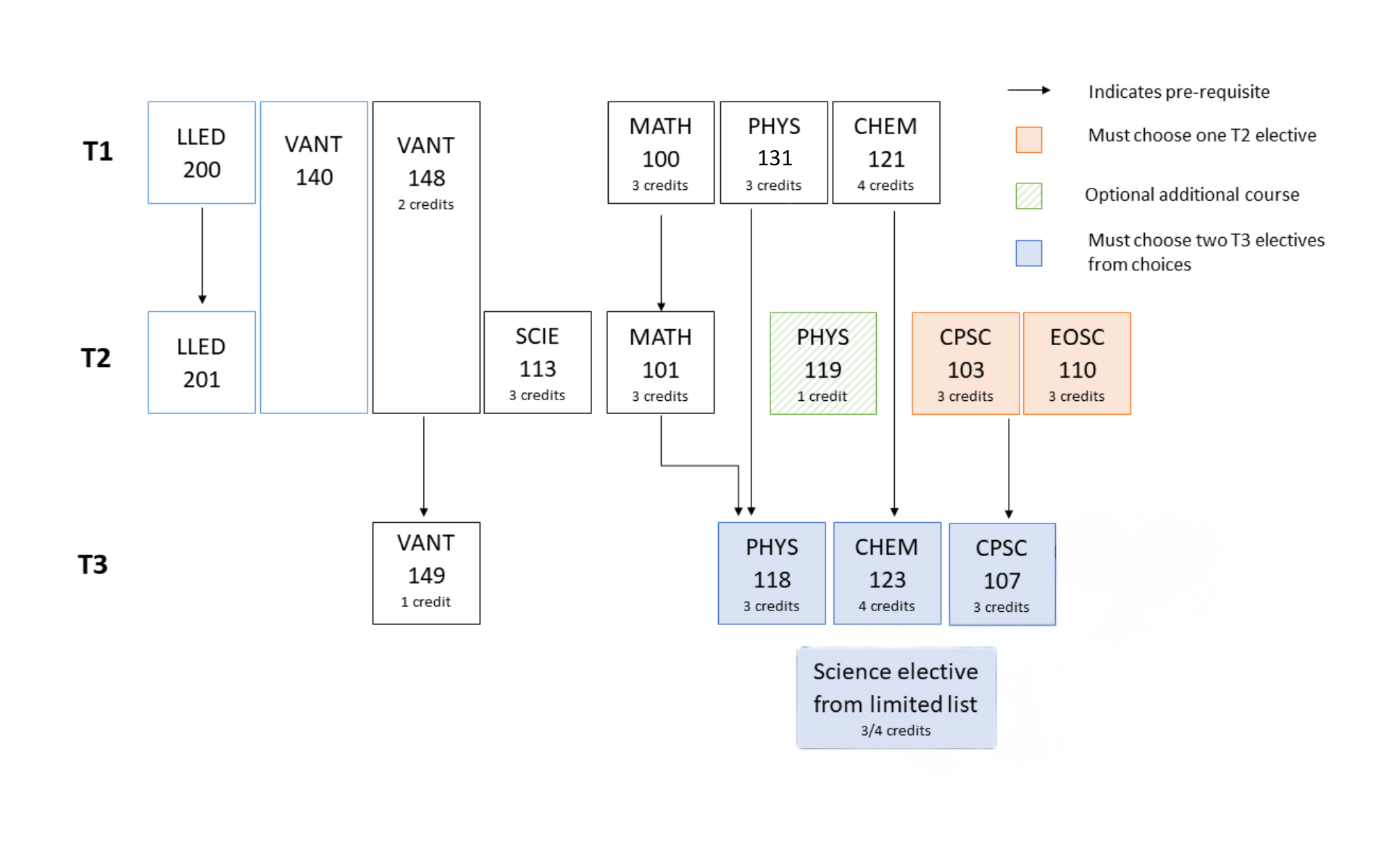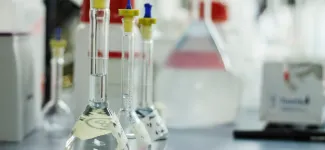Vantage One Science
(Bachelor of Science degree program)
The Science program at UBC Vantage College establishes a foundation of knowledge through a core set of science courses that range from chemistry to calculus to programming. You will have the option of selecting computational and physical science electives.

Possible Specializations (Majors) After Your First Year
All Vantage One Science students complete Term 1, Term 2 and Term 3 (May to July) at UBC's Vancouver campus. Upon successful completion of the Vantage One Science program, you will progress into second year and finish your Bachelor of Science at UBC Vancouver. This is not a complete list from the UBC calendar, but it is a starting point to help you begin your research into the different specializations (majors). It is up to you to determine that you meet the appropriate requirements for the majors you are interested in. Speak to your academic advisor to help you plan your degree.
Core Courses
Students all take a core set of science courses, and have the option of one elective in Term 2 and two electives in Term 3. All courses take place at UBC Vancouver.
CHEM 121 (4 credits, Term 1)
Structural Chemistry, with Application to Chemistry of the Elements
This course examines the fundamentals of structural chemistry. Specific topics are atomic structure and periodicity, chemical bonding theories, molecular geometry, quantum mechanics of light and particles, including the quantum structure of the periodic table and descriptive chemistry of main-group elements, with industrial and environmental applications. Laboratory work includes both qualitative and quantitative techniques, and problem solving.
LLED 200 (3 credits, Term 1)
Introduction to Writing in Academic and Professional Registers
This course introduces students to writing in university. It promotes deeper understanding of the role of language in achieving academic and professional registers by providing explicit instruction in language-linked strategies for writing effectively, individualized feedback, and extensive opportunities to write across a variety of university registers.
LLED 201 (3 credits, Term 2)
Critical Reading and Writing in Academic and Professional Registers
In this course, the heightened awareness of effective academic writing gained in LLED 200 is applied to a small research project that students design, implement and report on. Students receive explicit, critically-framed instruction in reading and writing academic reports, and individualized feedback on the draft sections of their research paper, including a research proposal.
MATH 100 (3 credits, Term 1)
Differential Calculus with Applications to Physical Sciences and Engineering
This course in differential calculus covers topics including limits, sequences and series, derivatives of elementary functions, curve sketching and optimization. There is an additional emphasis on mathematical reasoning and proof.
MATH 101 (3 credits, Term 2)
Integral Calculus with Applications to Physical Sciences and Engineering
This course in integral calculus covers topics including the Fundamental Theorem of Calculus, techniques of antidifferentiation, applications of integration and power series. There are additional emphases on differential equations and mathematical reasoning and proof.
PHYS 131 (3 credits, Term 1)
Energy and Waves
Fluids, harmonic oscillator, travelling waves, standing waves, sound, and interference of light waves, radioactivity including biological applications.
SCIE 113 (3 credits, Term 2)
First-Year Seminar in Science
This first-year seminar in science explores science as a comprehensive way of knowing. Classes involve debates, discussions and other activities to investigate what science is, how it is done and how it impacts daily life. The course introduces students to scientific writing: how to effectively use empirical evidence to support arguments, how to write clearly and concisely and how to cite evidence properly, in addition to how to look critically at arguments made by others.
VANT 140 (4 credits, Terms 1 and 2)
Content and Language Enrichment Tutorials
Sustained language support for linked content courses in the Vantage One Program. Students develop strategies for self-directed learning.
VANT 148 (2 credits, Terms 1 and 2)
UBC Vantage College Projects
Projects linked to topics explored in the UBC Vantage College Vantage One Program curricula.
VANT 149 (1 credit, Term 3)
Multidisciplinary Research Project
Research project that culminates in student-led conference and research presentation.
Electives
In addition to the set of core courses detailed above, students have the option of one elective in Term 2 and two electives in Term 3, in various areas of science, including Computational and Physical Sciences . All courses take place at UBC Vancouver.
Computational Sciences
More than ever before, computers, data and information play a vital role in science and everyday life. In the Computational Sciences stream, you will learn how computational thinking helps us to understand a wide variety of complex systems, including the human brain, public health policy and weather.
Physical Sciences
If you have ever wanted to know why the sky is blue, or what the earth is made of, the Physical Sciences stream is the right option for you. While exploring the key concepts of central scientific disciplines, you will discover essential knowledge about the world around us. Following your first-year experience at Vantage College, you can specialize in Astronomy, Earth, Ocean & Atmospheric Sciences, Geophysics, and many other disciplines.
Term 2 Electives
CPSC 103 (3 credits)
Introduction to Systematic Program Design
This course introduces students to computation as a tool for systematic problem-solving in non-Computer Science disciplines. Students will learn introductory programming skills in Python. No prior programming experience is expected.
EOSC 110 (3 credits)
The Solid Earth: A Dynamic Planet
The course explores the Earth's origin, composition, structure and natural resources. Topics include plate tectonics as the driving force for volcanism, mountain building, and earthquakes; imaging Earth's interior; environmental geoscience and sustainability.
PHYS 119 (1 credit)
Experimental Physics Lab
Introductory laboratory course, with emphasis on data collection, data analysis techniques, and scientific reasoning. This course must be taken along with PHYS 118, and the two courses count as a single elective choice.
Term 3 Electives
CHEM 123 (4 credits)
Physical and Organic Chemistry
This course examines the principles of equilibrium and chemical thermodynamics, the properties gases, liquids and solids as well as introductory organic chemistry: stereochemistry; substitution, elimination and oxidation-reduction reactions. Related laboratory work includes both qualitative and quantitative analysis.
CPSC 107 (3 credits)
Systematic Program Design
Students who complete CPSC 103 and then decide to pursue further study in Computer Science can take CPSC 107 to complete the learning goals necessary to continue with further computing courses. This course continues the systematic program design introduced in CPSC 103.
PHYS 118 (3 credits)
Electricity, Light and Radiation
Optics, electricity and magnetism, electric circuits, radioactivity, including biological applications. This course must be taken along with PHYS 119, and the two courses count as a single elective choice.
Additional Elective (3 credits)
A selection of additional Science electives will be offered in Term 3 from a limited list.
Vantage One Science Course Table

